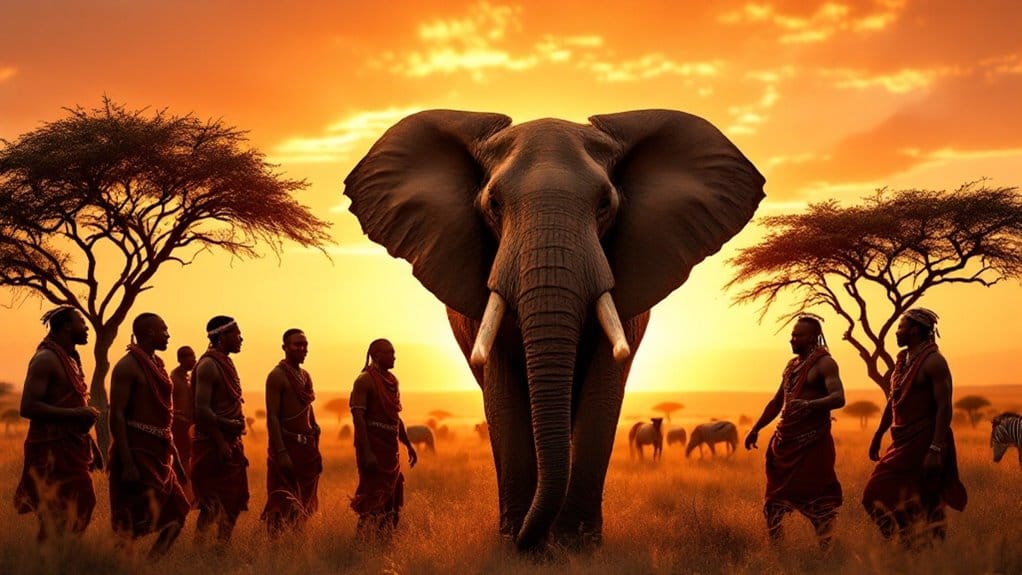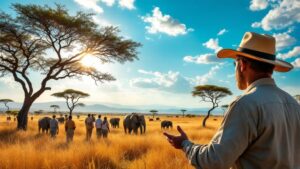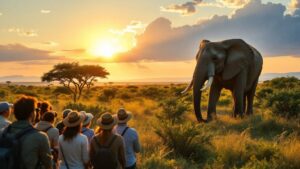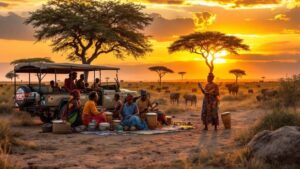Picture a vast savanna at dusk, where the silhouettes of elephants roam freely against a backdrop of vibrant sunsets. You might not realize it, but these majestic creatures hold profound significance in the lives of local communities, weaving a rich tapestry of identity, heritage, and spirituality. As you explore this connection, you'll uncover the layers of meaning embedded in traditional practices and moral lessons that resonate through generations. What unfolds next could reshape your understanding of not just wildlife, but the very essence of community and conservation in Africa.
Key Takeaways
- Wildlife is central to community identity, providing food and materials while featuring prominently in cultural myths and practices.
- Animals serve as totems, embodying values and guiding communities through moral lessons and spiritual connections.
- Festivals and rituals involving wildlife reinforce cultural bonds and honor ancestral spirits, highlighting the spiritual significance of animals.
- Indigenous knowledge fosters sustainable resource management and harmonious coexistence with wildlife, enhancing cultural preservation.
- Wildlife tourism contributes economically to communities, incentivizing conservation and local engagement in protecting biodiversity.
Significance of Wildlife in Cultures
Wildlife holds an undeniable significance in African cultures, weaving itself into the very fabric of community identity and heritage. You'll find that animals aren't just creatures roaming the landscape; they embody spiritual significance and are revered as symbols of forces beyond human understanding.
Through traditional methods, like hunting and subsistence farming, wildlife supports community livelihoods, providing food, tools, and materials essential for survival.
In your journey through African cultures, you'll discover how creation myths and oral traditions prominently feature wildlife, shaping cultural identities and values. This connection is palpable in the names communities share with local flora and fauna, emphasizing a deep-rooted bond that nurtures a sense of belonging.
Moreover, wildlife conservation isn't just a modern concern; it's intertwined with cultural practices that honor these animals. From artistic expressions in music and festivals to the sacred totems that guide community practices, wildlife plays a pivotal role in cultural preservation.
Spiritual Connections With Animals
In African cultures, animals aren't just creatures; they're spiritual guides that connect you to your ancestors and the divine.
Through rituals and symbolism, these animals embody courage, strength, and the essence of your community's identity.
Animals as Spiritual Guides
Embodying the essence of spiritual connections, animals in many African cultures serve as essential guides, symbolizing protection and ancestral links. Imagine standing alongside a lion totem, like the Zulu's, that embodies courage and strength. This isn't just symbolism; it's a profound spiritual bond that impacts lives and communities.
Animals aren't merely part of the environment; they're woven into the very fabric of cultural identity. They appear in creation myths and rituals, acting as intermediaries between humans and the divine. Through these spiritual beliefs, you connect with forces beyond comprehension, finding guidance in the animal kingdom.
Communities often honor these connections with rituals, including animal sacrifices, reinforcing their commitment to harmony with the spiritual domain. Festivals, like the Dipo initiation ceremony, celebrate wildlife, deepening the understanding of animals as spiritual guides.
Totems reflect a deep-rooted respect for these creatures, reminding us that animals carry wisdom and moral lessons essential for human existence.
Rituals and Symbolism
Through vibrant rituals and rich symbolism, African cultures celebrate their profound connections with animals, weaving these relationships into the very essence of their identities. Animals serve as totems, embodying attributes that guide and protect communities. For instance, the Zulu lion symbolizes courage, while Maasai cattle represent wealth. These spiritual connections manifest in various rites and ceremonies, like animal sacrifices, allowing communities to communicate with deities and honor ancestors.
The significance of animals also shines through in creation myths and traditional stories, where creatures such as crocodiles and elephants play pivotal roles in shaping human existence. Festivals like the Dipo initiation ceremony and the Okavango Delta Dune Dance Festival further strengthen community bonds and showcase cultural reverence for wildlife.
Here's a glimpse of the connections between animals and cultural practices:
| Animal | Symbolism | Rituals |
|---|---|---|
| Lion | Courage | Initiation ceremonies |
| Cattle | Wealth | Harvest celebrations |
| Crocodile | Transformation | Storytelling and oral traditions |
| Elephant | Wisdom | Community gatherings and festivals |
These rituals and symbols not only reinforce identity but also highlight the spiritual essence of wildlife in African communities.
Traditional Practices and Daily Life
African wildlife isn't just a backdrop to daily life; it's woven into the very fabric of traditional practices and community identity. For many indigenous communities, wildlife holds spiritual and cultural significance, influencing rituals that shape their existence.
Take the Maasai people, for instance. Their pastoral lifestyle revolves around cattle, which symbolize not just sustenance, but their cultural heritage and social standing.
Engaging in wildlife management, these communities rely on a profound understanding of animal behavior, essential for survival and resource sustainability. Spiritual ceremonies, including animal sacrifices, honor ancestors and deities, reinforcing connections between wildlife and the community's identity.
Festivals like the Dipo initiation ceremony celebrate wildlife, acting as vibrant platforms for passing down traditional knowledge and values.
In these practices, you see the heartbeat of communities that cherish their bond with nature. By embracing these traditions, you're not just participating in cultural expressions; you're contributing to a rich legacy that intertwines every facet of life with the wonders of African wildlife.
This connection is a reminder that when you honor these traditions, you also honor the spirit of the land and its incredible inhabitants.
Economic Impact of Wildlife
Wildlife plays an essential role in Africa's economy, driving revenue and creating opportunities that uplift local communities. Wildlife tourism generates substantial income, with ecotourism lodges in Rwanda alone contributing $2.9 million through sustainable practices. This revenue helps communities thrive, fostering a sense of belonging and shared purpose.
Moreover, the economic value of wildlife extends beyond tourism. Community-led conservation initiatives, like Tanzania's SAGCOT, not only promote wildlife migration corridors but also enhance agricultural productivity for around 2,000 small-scale farmers. This synergy between wildlife management and agriculture illustrates how conservation efforts can benefit everyone involved.
However, the illegal wildlife trade poses a grave economic threat. Poaching and trafficking undermine sustainability, jeopardizing livelihoods that depend on wildlife for tourism and trade.
When wildlife resources diminish, so do the opportunities for local communities to prosper.
Conservation Challenges in Africa
Conservation in Africa faces urgent challenges that threaten its rich biodiversity, from rampant poaching and illegal trade to devastating habitat loss.
You can see how community engagement is vital; when locals benefit economically from wildlife, they become powerful allies in protecting it.
Together, we can tackle these issues and guarantee a vibrant future for Africa's wildlife.
Poaching and Illegal Trade
Every year, millions of animals fall victim to poaching and illegal trade, threatening the delicate balance of ecosystems and the survival of iconic species. The stark reality is that elephant populations have plummeted to just 10% of what they were a century ago, while lions have vanished from 26 African countries. This isn't just a statistic; it's a call to action.
The illegal trade in wildlife products, like ivory and rhino horn, generates billions annually, putting endangered species at grave risk.
But you can make a difference. Conservation efforts need you—your voice, your passion, and your commitment. Community involvement has proven successful in places like Rwanda, where ecotourism has generated millions for locals while protecting wildlife.
You can help raise awareness, support ethical tourism, and advocate for stronger laws against poaching.
Together, we can combat the forces that threaten wildlife populations and ecosystems. By joining hands, we can create a future where both people and wildlife thrive.
Don't just stand by; become part of the solution. Our shared responsibility to protect Africa's extraordinary natural heritage starts with you.
Habitat Loss Issues
The battle against poaching and illegal trade highlights another pressing threat facing Africa's incredible wildlife: habitat loss. Every minute, 100 trees vanish, resulting in a staggering 15 billion cut down annually. This habitat destruction is decimating biodiversity, with ecosystems collapsing and wildlife populations declining.
Imagine a future where the majestic lion, once roaming freely across 26 African countries, is a mere memory, or where elephants, reduced to just 10% of their former glory, can no longer thrive in their natural habitats.
The urgency of conservation efforts can't be overstated. Since civilization began, we've lost about 83% of wild animals and nearly half of plant species—an alarming trend that jeopardizes not only wildlife but also cultural heritage tied to these species.
African communities, who've lived in harmony with nature for generations, face the heartbreaking reality of losing their identity as these ecosystems vanish.
We must unite to combat habitat loss, advocating for sustainable practices that protect our wildlife and the rich biodiversity that sustains us all.
Together, we can guarantee that future generations experience the beauty of Africa's wildlife and the cultural significance it holds. Your voice matters—let's make it heard!
Community Engagement Strategies
Engaging local communities is essential for tackling conservation challenges in Africa, and countless success stories illustrate this. When you involve local communities in wildlife preservation, you're not just protecting biodiversity; you're fostering a sense of belonging and shared responsibility.
Initiatives like Rwanda's ecotourism lodges have generated an impressive $2.9 million for locals, showcasing the economic benefits of community engagement in conservation efforts.
The SAGCOT initiative in Tanzania demonstrates how wildlife conservation can coexist with agriculture, benefiting small-scale farmers while promoting migration corridors for wildlife.
Establishing community conservancies, such as those linking Zimbabwe and Mozambique, has proven effective in protecting habitats and enhancing biodiversity through local participation.
Moreover, anti-poaching legislation combined with community engagement has led to remarkable recovery successes, including rising rhino populations in Kenya.
Ongoing partnerships between local communities and conservation organizations are fundamental for sustaining these efforts.
By investing in community-driven conservation initiatives, you're not only preserving wildlife but also empowering communities to honor their cultural heritage.
Together, we can build a future where both nature and people thrive, fostering a deeper connection to Africa's rich wildlife and cultural landscapes.
Role of Indigenous Knowledge
Indigenous knowledge plays an essential role in shaping the relationship between communities and their surrounding wildlife. This deep-rooted wisdom, passed down through generations, emphasizes the importance of harmonious coexistence. It's not just about survival; it's about identity and belonging.
Through sustainable resource management practices, communities guarantee the preservation of local wildlife populations and their habitats. Cultural taboos and rituals reflect a profound respect for nature, often serving as protective measures for specific species. When you understand these practices, you see how they're intertwined with the community's well-being.
The integration of indigenous knowledge with modern conservation strategies has proven effective, as demonstrated in Namibia's successful protection of desert-adapted elephants. Community-Based Conservation (CBC) initiatives empower local populations to take charge of wildlife stewardship.
Community-Based Conservation Models
Harnessing local knowledge and cultural values, Community-Based Conservation (CBC) models create a powerful framework for wildlife management that resonates with the people directly impacted by conservation efforts.
By empowering local communities to manage and protect wildlife resources, CBC fosters sustainable practices that honor traditional ways of life.
Take Rwanda, for example, where ecotourism lodges, born from CBC initiatives, have generated $2.9 million for local communities. This isn't just money; it's a lifeline that strengthens cultural ties while showcasing the economic benefits of wildlife conservation.
Similarly, Tanzania's SAGCOT initiative creates migration corridors, supporting both wildlife and 2,000 small-scale farmers, blending agriculture with conservation seamlessly.
Community conservancies, bridging Zimbabwe and Mozambique, enhance habitat protection through collaborative resource management, proving that when communities unite, wildlife flourishes.
The notable recoveries of endangered species, like the rising rhino populations in Kenya, underscore the impact of increased community involvement.
You belong in this movement, where cultural values and sustainable practices intertwine to create a future where both people and wildlife thrive.
Embrace the power of community-based conservation; together, we can weave a rich tapestry of progress and harmony.
Global Support for Conservation
Global support for conservation is essential in preserving the intricate relationship between wildlife and African cultures. When you invest in wildlife conservation, you're not only protecting animals but also safeguarding cultural identity and heritage. Community-led conservation initiatives, like those in Rwanda, showcase how economic benefits can flow back to local residents, creating a sense of belonging and shared purpose.
| Initiative | Economic Impact |
|---|---|
| Rwanda's Ecotourism Lodges | $2.9 million for locals |
| Mountain Gorilla Recovery | Boost in tourism revenue |
| AWF & WWF Funding | Resources for locals |
| Local Knowledge Integration | Enhanced conservation |
| Community Engagement | Empowerment through stewardship |
Engaging With African Cultures
Engaging with the vibrant tapestry of African cultures opens up a world of rich traditions and diverse perspectives that can transform your understanding of humanity.
With over 3,000 distinct ethnic groups, each boasting unique customs and languages, you'll find an incredible array of cultural traditions waiting to be discovered. When you immerse yourself in these experiences—like sharing stories with Maasai elders or learning traditional beadwork techniques—you foster empathy and global awareness that enrich your life.
Participating in cultural tourism, especially in wildlife regions, allows you to support responsible tourism practices that not only enhance your experience but also contribute to the economic health of local communities.
By embracing local cuisine and supporting local vendors, you play an essential role in cultural preservation, ensuring that these invaluable traditions continue for future generations.
Your engagement matters. It helps sustain the delicate balance between wildlife conservation and cultural practices, promoting sustainable development.
Frequently Asked Questions
Why Are Animals Important in African Culture?
Animals are essential in African culture because they embody deep spiritual connections and serve as powerful symbols in community beliefs.
Through animal symbolism, traditional stories come alive, enriching cultural rituals that bond people together.
You can see this reflected in wildlife conservation efforts, where communities actively participate, understanding the crucial role these creatures play.
Why Is African Wildlife Important?
African wildlife isn't just a treasure trove of beauty; it's a lifeline for our planet. Your involvement in conservation efforts helps maintain ecological balance and supports biodiversity preservation.
By engaging with educational programs, you'll see the tourism impact that generates income for local communities. When you participate in community engagement, you're not only protecting wildlife but also nurturing a shared heritage that binds us all together.
Your passion can spark change and inspire future generations.
What Is the Importance of African Culture?
African culture's importance lies in its rich cultural heritage, which shapes community identity and fosters belonging.
You'll find traditional practices rooted in storytelling significance, where tales pass down wisdom and values.
Spiritual beliefs intertwine with art symbolism, reflecting a deep connection to history and nature.
Embracing this diversity not only honors individual identities but also strengthens communal ties, reminding you that every story and tradition contributes to the vibrant tapestry of humanity.
What Is the Purpose of the African Wildlife Foundation?
The African Wildlife Foundation's purpose revolves around essential conservation efforts that protect endangered species and their habitats.
By engaging local communities, it fosters a sense of ownership and responsibility, ensuring habitat preservation and promoting sustainable tourism.
Through wildlife education, you'll learn about the importance of biodiversity and the need for species protection.
Together, you can create a future where both wildlife and people thrive, making a real difference in Africa's natural heritage.
Conclusion
In the vibrant tapestry of African cultures, wildlife isn't just part of the landscape; it's woven into the very fabric of community identity and spirituality. Imagine standing under the vast African sky, where the roar of a lion resonates with ancestral stories, and the rustle of leaves whispers wisdom. By preserving these essential connections, you're not just protecting animals; you're safeguarding a legacy that binds generations. Let's honor this rich heritage, ensuring that future generations can also experience this profound bond.




